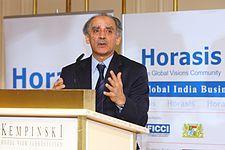Arun Shourie
Arun Shourie was born in Jalandhar, Punjab, India on November 2nd, 1941 and is the Indian Journalist And Politician. At the age of 83, Arun Shourie biography, profession, age, height, weight, eye color, hair color, build, measurements, education, career, dating/affair, family, news updates, and networth are available.
At 83 years old, Arun Shourie physical status not available right now. We will update Arun Shourie's height, weight, eye color, hair color, build, and measurements.
Shortly after receiving PhD in economics from Syracuse University Shourie joined World Bank as an economist in 1967 where he worked for more than 10 years. Simultaneously, between 1972–74, he was a consultant to the Indian Planning Commission and it was around this time that he began writing articles as a journalist, criticising economic policy.
In 1975, during The Emergency imposed by then prime minister, Indira Gandhi, Shourie began writing for the Indian Express in opposition to what he saw as an attack on civil liberties. The newspaper, owned by Ramnath Goenka, was a focal point for the government's efforts at censorship. He became a fellow of the Indian Council of Social Science Research in 1976. In January 1979, Goenka appointed Shourie as executive editor of the newspaper, giving him a carte blanche to do with it as he saw fit. He developed a reputation as an intelligent, fearless writer and editor who campaigned for freedom of the press, exposed corruption and defended civil liberties such that, in the words of Martha Nussbaum, "his dedication to the truth has won admiration throughout the political spectrum".
Shourie has been called a "veteran journalist". Shourie was a winner of the Ramon Magsaysay Award in 1982, in the Journalism, Literature and Creative Communication Arts category as "a concerned citizen employing his pen as an effective adversary of corruption, inequality and injustice." In 2000, he was named as one of the International Press Institute's World Press Freedom Heroes. He has also been named International Editor of the Year Award and was awarded The Freedom to Publish Award.
He was nominated from the state of Uttar Pradesh as a BJP representative for two successive tenures in the Rajya Sabha, thus being a Member of Parliament for 1998–2004 and 2004–2010. He held the office of the Minister of Disinvestment, Communication and Information Technology in the government of India under Vajpayee's prime ministership. As Disinvestment Minister, he led the sale of Maruti, VSNL, Hindustan Zinc among others.
Shourie was among many who objected to The Muslim Women (Protection of Rights on Divorce) Act 1986, which the government headed by Rajiv Gandhi proposed to alleviate communal violence and retain Muslim votes. Claimed by the government to be a reinforcement of India's constitutional secularism, it was widely criticised by both Muslims and Hindus. The liberals among them, says Ainslie Embree, saw it as "a capitulation to the forces of Islamic obscurantism, a return ... to the thirteenth century"; the Hindu revivalist critics thought it was "weakening Indian unity". Shourie wrote articles that tried to show that the treatment of women as required by the Quran would in fact offer them protection, although the application of Islamic law in practice was oppressing them. He was in turn criticised for what was perceived as a thinly-veiled attack on Islam itself, with Rafiq Zakaria, the Muslim scholar, saying that Shourie's concern for reform of Islam was in fact demonstrative of Hindu contempt that used the plight of Muslim women as an example of the backwardness of the community. Vir Sanghvi termed it "Hindu chauvinism with a liberal face".
After the defeat of the BJP in 2009 general elections, Shourie asked for introspection and accountability within the party. He deplored factionalism within the party and those who brief journalists to aid their own agenda.
Shourie has been described by Christophe Jaffrelot, a political scientist, as "a writer sympathetic to militant Hindu themes" and has publicly voiced support for the aims of the Rashtriya Swayamsevak Sangh (RSS), a nationalist Hindutva organisation. This has caused unease among some of those who admire his journalism. He has said that, although he sees a danger from perceived Muslim violence such as the Godhra train burning incident of 2002, people have tended to redefine the "Hindutva" term. He says that prominent members of the Bharatiya Janata Party (BJP), of which he is a member and which has ties to the RSS — specifically, L. K. Advani and Atal Bihari Vajpayee — have shown their opposition to sectarian hatred and in their attempts to make the BJP inclusive have tried to marginalise those on both the Muslim and Hindu extremes who promote such hatred. As a political scientist he views that present electoral system does not concern competency and integrity. He emphasised his views in a cultural conference called Tomorrow’s India Global Summit and added that the pressure to bring about change in the present electoral system should come from the society.
Arun Shourie has written numerous books. According to Martha Nussbaum, the traits of his writings are:
With the exception of Mahatma Gandhi, he has little time for any religious thinker and, says Nussbaum, his books "nowhere ... seek to provide balance; nowhere is there a sense of complexity. All have the same mocking, superior tone."
Historian D.N. Jha criticized Shourie's book Eminent Historians, which concerned the NCERT controversy, that it contains "slander" and "has nothing to do with history."
